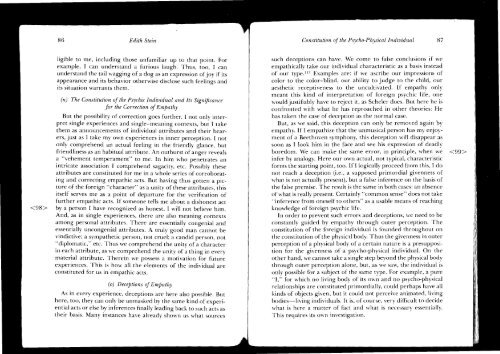The Collected Works of EDITH STEIN ON THE PROBLEM OF EMPATHY
Create successful ePaper yourself
Turn your PDF publications into a flip-book with our unique Google optimized e-Paper software.
Edith Stein<br />
C onstitution <strong>of</strong> the P slcho-P hlsicaL I ndiuidual 87<br />
ligible to me, including those unfamiliar up to rhar point. For<br />
example, I can understand a furious laugh. Thus, too, I can<br />
understand the tail rvagging <strong>of</strong> a dog as an expression <strong>of</strong>.joy if its<br />
appearance and its behal'ior othenvise disclose such {'eelinqs and<br />
its situation warrants them.<br />
(n) <strong>The</strong> Constitution <strong>of</strong> the Psychic Indiaidual and lts Signifcance<br />
for the Correction <strong>of</strong> Empathl<br />
But the possibility <strong>of</strong> correction goes furtl'rer. I not only interpret<br />
single experiences and single-meaning contexts, but I take<br />
them as announcements <strong>of</strong> individual attributes and their bearers,<br />
just as I take my own experiences in inner perception. I not<br />
only con'rprehend an actual feeling in the friendly glance, but<br />
Iriendliness as an habitual attribute. An outburst <strong>of</strong> anger reveals<br />
a "vehement temperament" to me. In him who penetrates an<br />
intricate association I comprehend sagacity, etc. possibly these<br />
attributes are constituted for me in a whole series <strong>of</strong> corroborating<br />
and correcting empathic acts. Bur having thus gotren a picture<br />
<strong>of</strong>the foreign "character" as a unity <strong>of</strong> these attributes, this<br />
itself serves me as a point <strong>of</strong> departure for the verification <strong>of</strong><br />
further empathic acts. If someone tells me about a dishonest act<br />
by a person I have recognized as honest, I u'ill not believe him.<br />
And, as in single experiences, there are also meaning contexts<br />
among personal attributes. <strong>The</strong>re are essentially congenial and<br />
essentiallt, uncongenial attributes. A truly' good man cannot be<br />
vindictive; a sympathetic person, not cruel; a candid person, not<br />
"diplomatic," etc. Thus rve comprehend the unity <strong>of</strong>'a character<br />
in each attribute, as \4'e comprehend the r.rnity <strong>of</strong> a thirrg in every<br />
material attribute. <strong>The</strong>rein we possess a motivation for futtrre<br />
experiences. This is how all the elements <strong>of</strong> the individual are<br />
constituted fcrr us in empathic acts.<br />
(o) Deceptions <strong>of</strong> Empathl<br />
As in every experience, deceptions are here also possible. But<br />
here, too, they can only be unmasked by the same kind <strong>of</strong> experiential<br />
acts or else by inferences finally leading back to such acts as<br />
their basis. Many instances have already shown us what sources<br />
such deceptions can have. We come to false conclusions if'we<br />
empathically take or-rr individual characteristic as a basis instead<br />
<strong>of</strong> our typ.."' Examples are: if r.r'e ascribe our impressions <strong>of</strong><br />
color to the color-blind, our ability to judge to the cl-rild, our<br />
aesthetic receptiveness to the uncultivated. If' empathy onll'<br />
meant this kind <strong>of</strong> interpretation <strong>of</strong> foreign psychic life, one<br />
would justifiably have to reject it, as Scheler does. But here he is<br />
confronted with what he has reproached in other theories: He<br />
has taken the case <strong>of</strong> deception as tl-le normal case.<br />
But, as rve said, this deceptior) can only be removed again bv<br />
empathv. If I empathize that the unmusical person has my enjoyment<br />
<strong>of</strong> a Beethoven symphony, this deception will disappear as<br />
soon as I look him in the face and see his expression o{'deadlv<br />
boredom. \4Ie can make the same error, in principle, rvhen we <br />
infer by analogy. Here our own actual, not typical, characteristic<br />
fbrnrs the starting point, too. If I logically proceed from this, I do<br />
not reach a deception (i.e., a supposed primordial givenness <strong>of</strong><br />
u'hat is r-rot actually present), but a false inference on the basis <strong>of</strong>'<br />
the false premise. <strong>The</strong> result is the same in both cases: an absetrce<br />
<strong>of</strong> what is really present. Certainly "common sense" cloes not take<br />
"infererrce from oneself to others" as a usable means <strong>of</strong> reaching<br />
knowledge <strong>of</strong> foreign psychic life.<br />
In order to prevent such errors and deceptions, we need to be<br />
constantly guided by ernpathy through outer perception. <strong>The</strong><br />
constitution <strong>of</strong> the fbreign individual is founded throughout on<br />
the constitution <strong>of</strong> the physical body. 'Ihus the givenness in outer<br />
perception <strong>of</strong> a physical body <strong>of</strong> a certain nature is a presupposition<br />
for the givenness <strong>of</strong> a psvcho-physical individual. On the<br />
other hand, we cannot take a single step beyond the physical body<br />
through outer perception alone, but, as we saw, the individual is<br />
only possible for a subject <strong>of</strong> the same tvpe. For example, a Irure<br />
"I," for which no living body <strong>of</strong> its own and no psycho-physical<br />
relationships are cor-rstituted primordially, could perhaps have all<br />
kinds <strong>of</strong> objects given, but it could not perceive animated, living<br />
bodies-living individuals. It is, <strong>of</strong> course, very difficult to decide<br />
what is here a matter <strong>of</strong> fact and rvhat is necessary essentially.<br />
This rerluires its oult investigation.

















